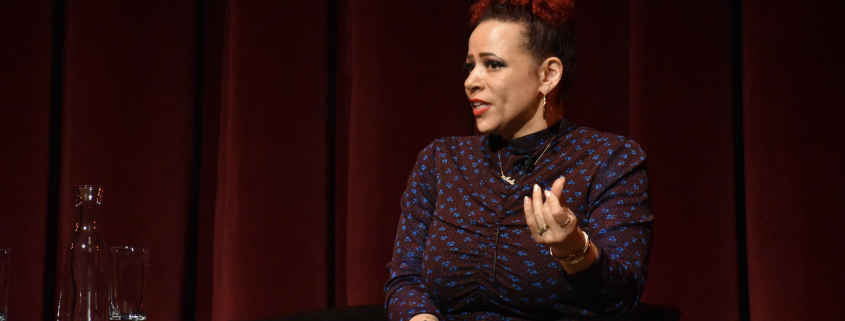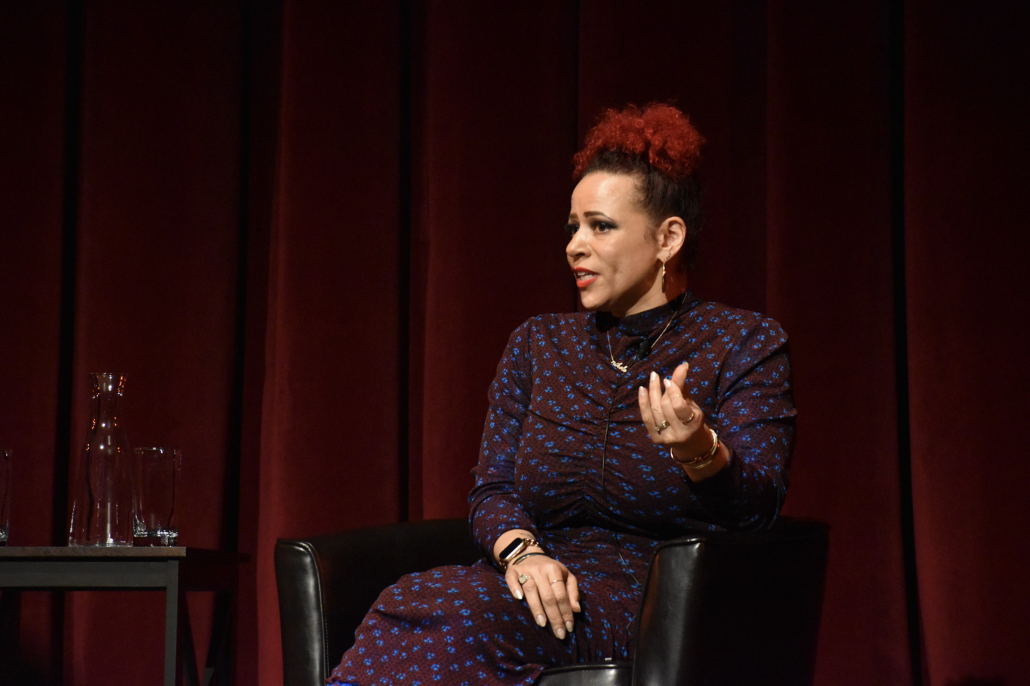Re-envisioning Black history: An evening with Nikole Hannah-Jones
Nikole Hannah-Jones, creator of “The 1619 Project,” spoke at USC Tuesday as part of the Charlotta Bass Media Trailblazer Speaker Series. The event was co-hosted by USC Visions & Voices and the USC Annenberg Charlotta Bass Journalism and Justice Lab. The event took place at 6 p.m. at Bovard Auditorium and included a brief Q&A period with three student fellows. Allissa Richardson, associate professor of journalism and communication at the Annenberg School for Communication and Journalism and founder of the Charlotta Bass Lab, moderated the event.
Before the discussion with Hannah-Jones, the audience viewed a short trailer from the Hulu original series “The 1619 Project.” The six episode docuseries began as a pitch to adopt a Sunday edition of The New York Times that planned to commemorate the 400th anniversary of the first enslaved people’s arrival in America. Following the issue, “The 1619 Project” evolved to include a novel, consisting of a collection of essays featuring Black scholars, touching on topics from healthcare to democracy and highlighting the legacy of slavery and how it has shaped modern institutions.
The evening opened with a performance by the SoCal VoCals of “A Change Is Gonna Come” by Sam Cooke, followed by a speech by President Carol Folt. Darnella Frazier, who recorded George Floyd’s murder in May 2020, was also slated to attend the event but could not make it at the last minute.
President Folt spoke about the legacy of Charlotta Bass, the first Black woman to own a newspaper, and commended the Lab for leading the effort to make Feb. 14 Charlotta Bass Day in Los Angeles. She also said that USC will not join the campaign to restrict and remove Black history curricula around the United States, a statement that was met with applause.
Richardson asked Hannah-Jones about her experience growing up in Waterloo, Iowa, in a multiracial household, at a time when Black students were being bussed to schools in white areas, and how that experience inspired her to spearhead “The 1619 Project.” Hannah-Jones spoke about her favorite teacher, Ray Dial, who taught a Black history elective when she was in high school, and how his class was what ultimately led to her becoming a journalist who writes about Black issues. Hannah-Jones also spoke about how she had to work up to pitching “The 1619 Project” to The New York Times editorial board, having to prove that it was a worthy topic to be in the magazine.
In the last few minutes of the event, Hannah-Jones took questions from student fellows. Rafiq Taylor, a graduate student studying public relations and advertising and fellow at the Charlotta Bass Journalism and Justice lab, opened the questions. He asked Hannah-Jones about fear of facing the past and reaching audiences that are unwilling to reckon with America’s history.
“In formulating my question, I was thinking as a fan of history and thinking about how today’s world is not so different from the past world because the conversation around Black liberation has always been happening,” Taylor said. “It’s just a matter of who gets to control that conversation, so I was wondering, what [Hannah-Jones’] take would be on the fear of facing that reality.”
Following Taylor’s question, Jen Byers, a graduate student studying specialized journalism, asked how to handle backlash and personal attacks when covering controversial topics or exposing corruption.
“I’m actually working on an investigation about this corruption situation … but I have been facing some pretty severe harassment from the person I am attempting to hold accountable,” Byers said. “I just knew that whatever answer [Hannah-Jones gave] — which was, ‘Fight them and don’t back down, and know that their insults are attempting to make you small” — would be good advice and I’m really grateful for it.’”
The event was initially supposed to take place in The Forum at Annenberg Hall, but Richardson said she elected to move it to Bovard because of security concerns.
There are “about eight different ways you can come in [to the Forum],” Richardson told the Daily Trojan in an interview. “I made the decision to close it off.”
Because Richardson elected to hold the event in Bovard, however, many more people were able to attend. Richardson said the event was capped at 2,000 RSVPs because the auditorium could only seat 1,400 people.
Professor Richardson said she was happy with how the event transpired.
“I knew that at some point you have to still be an interviewer, but I was really caught up in listening to the answers,” Richardson said. “It was a real treat as a professor just gobbling up all the knowledge and sticking pins in things I’d like to read more about.”
Hannah-Jones told the Daily Trojan that she was excited to come and speak at USC for the event.
“I think the lab that Dr. Richardson just launched is so important,” Hannah-Jones said. “It so aligns with the work that I’m doing both as a journalist and as a professor and as someone in the field who tries to train and mentor and uplift the voices of Black journalists.”
Hannah-Jones also expressed her gratitude for the crowd that had assembled to hear her speak, especially as a reprieve from the harsh criticism and threats for her work she regularly faces from others.
“Sometimes it’s easy to focus on people who are attacking the work or disparaging the work,” Hannah-Jones said. “Then you come into a space like this and are reminded of what the work means to so many people.”


